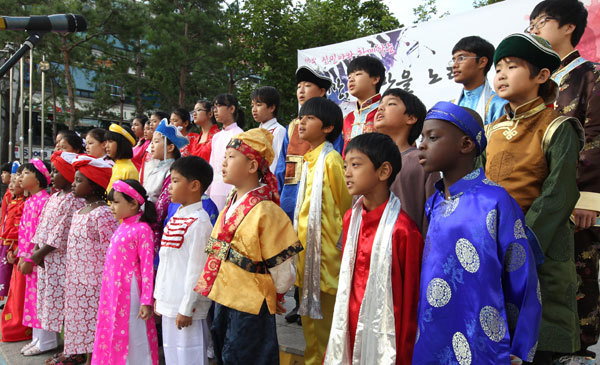The ministry said it is careful not to overemphasize differences between the multicultural soldiers and their peers.
“While life in the barracks is basically a corporate life, the commissioned officers and commanders in the military units will consider the different needs of the soldiers,” an official from the Defense Ministry said.
“We have not been informed of soldiers having difficulties with the diet, or religion.”
In a further step, the five-year immigration reform plan announced in 2018 included a proposal to review compulsory military service for naturalized Koreans.
While the discussion arose in the context of fairness, it also encompassed concerns about security, with some arguing that there would be “Chinese troops,” considering that many naturalized Koreans come from China.
While the inclusion of soldiers from diverse cultural backgrounds represents great progress, said Seol Dong-hoon, a sociology professor at Chonbuk National University, it may be premature to discuss conscription for naturalized Koreans.
“While soldiers from multicultural households are born as Koreans and are naturally imposed with the mandatory military service, the situation is different for naturalized Koreans. Besides, it may not be best to make their duty mandatory, because many of them become naturalized Koreans to pursue their professional careers here -- like athletes.”
A year has passed since the proposal was announced, but not much has been discussed. The Defense Ministry said it is reviewing the matter and will comprehensively consider what is fair and what influence such a step might have on society.
More efforts are being made, but society’s fundamental perspective needs to change, Navy Lt. Rhee Keun said. Lt. Rhee, who gave up his US citizenship and came to Korea to enlist as a commissioned officer here, said he had endured numerous discriminatory remarks in his eight years of service.
“When I first joined the Navy here, I had regrets. The senior soldiers would often call me ‘Yankee’ and tell me to go back to my country,” he said. Rhee graduated from the Virginia Military Institute in the United States in 2007.
“They bully you when you come from another country. I did not speak Korean well, did not know much about the Korean culture and I was clumsy at first. So it was very stressful,” he said, adding that the closed military culture revolving around regionalism and school ties should be rejected.
A survey of 131 early-career commissioned officers, undertaken for a doctoral dissertation published last year, hinted that contradictory sentiments about soldiers with multicultural backgrounds have not disappeared.
When asked about the pros and cons of having soldiers from different cultural backgrounds, the officers said their presence could lead to more creative thinking and flexibility in the currently rigid, conservative military and could also reduce discrimination against multicultural families, according to “Officers’ Awareness of Multiculturalism in the Military and Implications for Policy Direction” by Youngsan University researcher Lee Yun-soo.
But they also projected doubts about whether soldiers from different backgrounds could have the same loyalty and devotion to the country, with some saying it would be hard to trust those soldiers in the event of war. Respondents raised concerns that there might be a greater risk of military secrets being leaked, or of Korea making “internal enemies.”
They also said cultural and language barriers could cause trouble inside the military.
“Korea is a country that has a relatively ‘high border’ inside the minds (of our people),” Prime Minister Lee Nak-yon said in announcing the five-year immigration reform plan in February 2018.
Still, Lt. Rhee said, it is important that that more people like him, people from different cultural backgrounds, join the military so that social attitudes can change.
“With more exposure, the sentiments will naturally change. I also believe it is important for everyone to contribute to the society they are in, in any way,” he said.
When it made headlines here that former lawmaker Jasmine Lee, a naturalized citizen from the Philippines, had sent her son to the military in 2016, Lee stressed that equal treatment of multicultural families was important to reduce discrimination.
“While the caring treatment (of multicultural children, by extending military exemptions) is appreciated, making such distinctions could also create a sense of alienation and trigger controversies,” Lee said in a media interview around that time.
For Jung Yeom, a naturalized Korean from China, it is important for her children to fulfill their social duty, even if it is worrying for her as a mother.
“I do worry, but I believe it is always difficult in the beginning, for everything. The country operates (its military system) as it should, and those who do not like it will have to leave,” Jung told The Korea Herald. Jung came to Korea in 1997 to marry her Korean husband and has two sons.
By Jo He-rim (
herim@heraldcorp.com)





![[KH Explains] For Korean automakers, Chinese EVs may loom larger than Trump’s tariffs](http://res.heraldm.com/phpwas/restmb_idxmake.php?idx=644&simg=/content/image/2024/11/14/20241114050537_0.jpg)
![[Graphic News] Tainan predicted top destination for South Koreans in 2025](http://res.heraldm.com/phpwas/restmb_idxmake.php?idx=644&simg=/content/image/2024/11/13/20241113050807_0.gif)

![[Herald Review] Cho Seung-woo takes 'Hamlet' crown](http://res.heraldm.com/phpwas/restmb_idxmake.php?idx=644&simg=/content/image/2024/11/14/20241114050593_0.jpg)